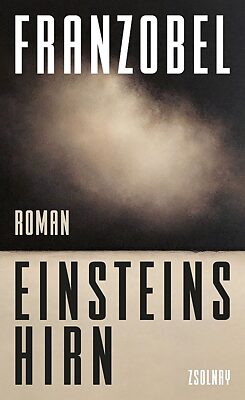Cherrypicker
Jellied Brains
Where exactly does genius reside? In Franzobel’s latest novel, an American pathologist asks that question – and steals the brain of the recently deceased Albert Einstein to find out.
By Holger Moos
On 18 April 1955, genius-of-the-century Albert Einstein died in a hospital in Princeton, New Jersey. The autopsy was performed by the pathologist Thomas Stoltz Harvey, who subsequently went down in history, albeit somewhat ingloriously. Harvey is the protagonist in Franzobel’s new novel Einsteins Hirn (Einstein’s Brain). It tells one of the “strangest of love stories.”
For the Austrian writer, with his penchant for rambling embellishments of historical facts and his foible for vulgarity, Harvey’s life story is a field day. Einstein’s corpse, barely cold, was properly plundered. Some hospital employees cut off locks of hair (“When the crematorium staff arrived at about one o’clock, Einstein’s head was nearly covered in stubble”), others wanted to break out a tooth. But Harvey outdid them all: He not only removed Einstein’s eyes for Einstein’s family doctor, who was also present, but also stole Einstein’s brain. He claimed that he wanted to find the Nobel Prize winner’s seat of genius. Although neither Einstein’s heirs nor his executors agreed, the pathologist did not return his loot for more than 40 years.
Purgatory or raspberry soufflé?
In the novel, the autopsy is described very vividly. Respect for the corpse? Not at all! “Not an appetising sight. A young body with peach hairs on its buttocks would be more pleasing... Einstein’s less hairy body was white as mozzarella.” The removal of the brain is also described – less than reverently – as “a convoluted lump covered in a web of veins.” What’s more, Einstein’s brain was not even particularly heavy, but “lighter than average.” Mass is apparently not a decisive factor.Harvey slips the brain into a jar filled with formaldehyde to keep it from collapsing under its own weight and soon looking like a “cowpat” and unceremoniously takes it home with him. There he deposits it, like an ordinary preserving jar, in his cellar. He does not yet suspect “that this brain would take possession of him, infiltrate and drag him down into the depths.” For the brain does not bring Harvey happiness, but begins to speak to the pathologist. At first it asks for a woman in Swiss German, later it talks about science and religion, everything under the sun.
Harvey is bound to the brain in almost lifelong fidelity, while his three marriages are of shorter duration. Of life with his first wife Elouise, “Sometimes his marriage seemed to him like a purgatory heated with bitterness, then again like a big raspberry soufflé.”
A great love of storytelling
Franzobel cleverly expands the plot with fictional secondary characters who recur over the course of the book and prominent historical milestones from the 50 or so years of Harvey’s life with Einstein’s brain: the Cold War, Elvis Presley, the Civil Rights movement, the assassination of John F. Kennedy, hippies and Woodstock, the moon landing, the end of the Vietnam War, the revolution in Iran, the attacks on John Lennon and Ronald Reagan, the fall of the Berlin Wall. Harvey and the brain also pay a visit to Einstein’s last lover, the spy Margarita Konenkova in Moscow, and the German RAF terrorist Inge Viett also makes an appearance. The author is not too particular about the boundaries between reality and fiction, true to the motto quoted at the beginning of the novel: “It’s the truth, even if it didn’t happen.” (Ken Kesey, One Flew Over the Cuckoo’s Nest)“Great wisdom and banality are often bedfellows,” says the narrator; a fitting maxim for this novel overflowing with crazy ideas, allusions, and absurdities. Despite some overly lengthy passages and although not every punchline hits home, it not only gave the author “noticeable pleasure to write this novel,” as Joachim Dicks says on NDR Kultur, it was also my pleasure as a reader to pursue his love of storytelling.
Franzobel: Einsteins Hirn. Roman
Wien: Zsolnay, 2023. 544 p.
ISBN: 978-3-552-07334-0
You can find this title in our eLibrary Onleihe (and the audio book).

